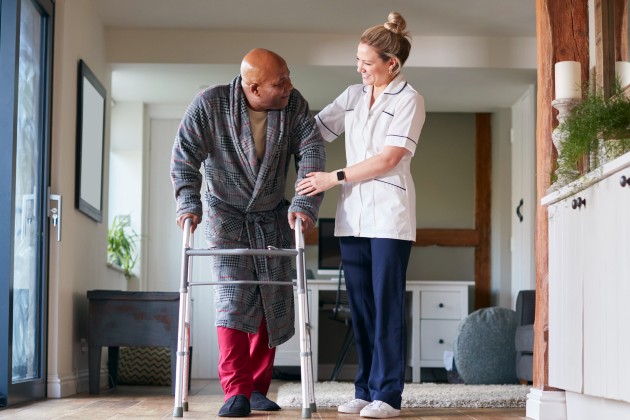“We have to care for others, you don’t know who is going to help you tomorrow,” says Moses, an asylum seeker from Namibia who grew up around strong nursing values. His auntie worked on a surgical ward and he was inspired by her tireless dedication to saving lives and doing so “with her whole heart, because care without caring is nothing.”
With previous experience as a carer, Moses discovered the RCN’s scheme for displaced people while studying for his GCSEs at Cardiff and Vale College. His dream now is to follow in his auntie’s footsteps.

‘I came here fearing for my life’
Ruth (whose name has been changed) fled Tanzania in February 2020 amid the uncertainty of the first COVID-19 lockdown. Upon arriving in the UK, she spent weeks in isolation with little human contact and without access to a television or internet. “I didn’t have a clue what was going on and my mental health declined,” she says.
When lockdown restrictions began to ease, Ruth reached out to the Refugee Council to find out what courses were available. “As an asylum seeker, I wasn’t allowed to work. I knew I had to do something to keep me busy,” she says. “I desperately wanted to work in care, so once online learning finally resumed, I studied for my care certificate.”
Studying was completely new to Ruth: “I didn’t go to college in my country, so I’m working extra hard to catch up.鈥疘 got a phone from a charity to access information and studied in English, even though my first language is Swahili.”
Ruth previously owned a jewellery store and never realised what a career in health care could look like. Through the RCN scheme, she is now learning about the structure of the NHS in Wales to find her interests and strengths.
Unique challenges
Displaced people face unique challenges, starting with often traumatic journeys to get here. The RCN scheme supports participants from very early stages in securing a right to work and DBS checks, through to job application guidance and simulated health care interviews.
What is the RCN Health Care Careers for Displaced People Scheme?
The displaced persons’ scheme is currently being facilitated as a pilot by the RCN Nursing Cadets team and is open to refugees and asylum seekers in Wales with the goal of securing employment or further education. Funded by Health Education Improvement Wales and working in partnership with the Welsh government and RCN education leads, the programme includes practical sessions, such as basic life support, manual handling, infection control and observational work experience.
- Read more about the scheme here.
- Email healthcarecareers@rcn.org.uk for more information.
Navigating a new cultural and professional maze is also a big focus. The scheme makes this huge transition easier by covering topics like effective study skills and exam approaches, unpacking competency-based criteria and understanding common colloquialisms and medical jargon. Participants then have the best chance of showcasing their skills and experience.
Unfortunately, even after coming this far, displaced people may then face unconscious bias. By linking with employers and universities, the RCN is working to break down these barriers.
After securing her refugee status, Ruth set out on her caring journey in the community. “We don’t have social care at home” she explains. “People take care of their own families. For me, working in care feels like taking care of my own loved ones.”
The scheme has expanded Ruth’s ambitions. “I now think I could go to university to study nursing,” she says. “At 43, I won’t let my age be a limitation. Eventually I’d love to work in a care home or in the NHS.”
Find out more
- Read the latest RCN guidance and support for nursing staff following the recent race riots.
- Find out about RCN guidance and advice for international members working in the UK.
- Find out more about the work of the RCN Nursing Cadet Scheme with Luke’s story.








